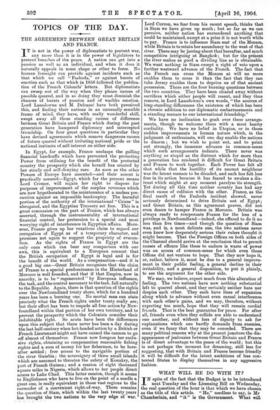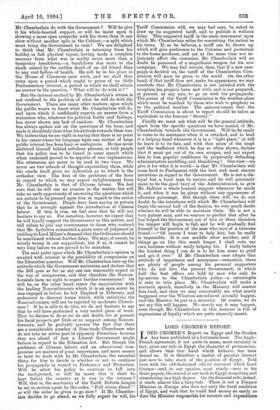But the interest excited by Mr. Chamberlain's return is not
confined to the problem of what be will do with the Government. There are many other matters upon which the public wants to know what Mr. Chamberlain will do, and upon which it confidently expects an answer from a statesman who, whatever his political faults and failings, has never shown any lack of candour. Mr. Chamberlain has always spoken out on the questions of the hour, and made it absolutely clear what his attitude towards them was. We believe that we are right in saying that there is no point in his career where his language upon any matter of large public interest has been hazy or ambiguous. He has never sheltered himself behind nebulous phrases, or told people that his policy was to be found in some speech which when examined proved to be capable of two explanations. His utterances are never to be read in two ways. We never see two schools of thought expounding them, while the oracle itself gives no indication as to which is the orthodox view. The first of the problems of the hour in regard to which we may expect enlightenment from Mr. Chamberlain is that of Chinese labour. We feel sure that he will use no evasion in the matter, but will take an early opportunity of answering the questions which are certain to be pressed upon him in regard to the action of the Government, People have been saying in private that he is strongly against the introduction of Chinese labour. If this is true, we feel sure that he will not hesitate to say so. For ourselves, however, we expect that be will loyally support the Government in this matter, and will refuse to give any countenance to those who contend that Mr. Lyttelton committed a grave error of judgment in yielding to Lord Miler's demand that the Ordinance should be sanctioned without further delay. We may, of course, be utterly wrong in our supposition-' but if so, it cannot be very long before we are proved tole mistaken.
The next point upon which Mr. Chamberlain's opinion is awaited with interest is the possibility of compromise on the Education question. Will Mr. Chamberlain take up the attitude which the Government maintains, and declare that the Bill goes as far as any one can reasonably expect in the way of compromise, and that therefore the Noncon- formists have no right to expect further concessions ? Or will he, on the other hand, renew the negotiations with the leading Nonconformists which it is an open secret he was engaged in before he left England in February, and endeavour to discover terms which, while satisfying the Nonconformists, will not be rejected by moderate Church- men ? If he is able to do this, we do not hesitate to say that he will have performed a very useful piece of work. That he desires to do so we do not doubt, for at present his fiscal projects get little or no support among Noncon- formists, and he probably ignores the fact that there are a considerable number of Free-trade Churchmen who do not take an active part in opposinc. Protection because they are afraid of how a Liberal' Government might behave in regard to the Education Act. But though the problems of Chinese labour and an educational com- promise are matters of great importance, and must sooner or later be dealt with by Mr. Chamberlain, the essential thing for him to decide is whether or not to continue his propaganda in regard to Preference and Protection. Will he allow his policy to continue to fall into the background, or will he insist that it shall be kept before the country as it was in the autumn ? Will, that is, the machinery of the Tariff Reform League be set in motion again by the order, "Full steam ahead ! " or will the order be given to go slow ? If Mr. Chamber- lain decides to go ahead, as we fully expect he will, his Finally we must ask what will be the general attitude, apart from the specific questions we have named, of Mr. Chamberlain towards the Government. Will he be ready to come to its assistance when it is attacked, and to lend it a helping hand whenever it is in a "tight place," or will he leave it to its fate, and with that scorn of the inept and the inefficient which he has so often shown, declare that it must get out of its own scrapes, and not expect him to lose popular confidence by perpetually defending administrative muddling and blundering '? Our view—we give it for what it is worth—is that Mr. Chamberlain will come back to Parliament with the best and most sincere intentions in regard to the Government. He is not a dis- loyal but a loyal man by nature, and he will genuinely mean to be the good fairy of the Administration, to give Mr. Balfour a whole-hearted support whenever he needs it, and when it can be given without any appearance of offensive patronage. But though these will, we do not doubt, be the intentions with which Mr. Chamberlain will begin the second half of the Session, we very much doubt whether he will be able to maintain them. He is not a very patient man, and we venture to predict that after he has helped the Government out of two or three blunders his temper will begin to fail, and he will gradually find himself in the position of the man who says of a tiresome friend :—" Of course I want to help him, but he really is impossible. It is one muddle after another, and if things go on like this much longer I shall ruin my own business without really helping his. I really believe the kindest thing I can do is to let him come to grief and get it over." If Mr. Chamberlain once adopts that attitude of impatience and annoyance—remember, there are plenty of people among his personal supporters who do not love the present Government, in which half the best offices are held by mon who only do lip-service to the Chamberlain policy—a catastrophe is sure to take place. Mr. Chamberlain will make a sarcastic speech, somebody in the Ministry will answer him back, and then we may conceivably see what nearly happened over the Wharton amendment actually happen, and the Ministry be put in a minority. Of course, we do not say this will happen. We merely say it may happen, even though Mr. Chamberlain at this moment is full of expressions of loyalty which are quite sincerely meant.
LORD CROMER'S REPORT.
LORD CROMER'S Report on Egypt and the Soudan has been published at h fortunate hour. The Anglo- French agreement, if not quite in name, most certainly in fact, gives our rule in Egypt the character of permanence, and allows that free hand which hitherto has been denied us. It is therefore a matter of peculiar interest just now to take stock of the position of Egypt. Told even with the old-fashioned official restraint which Lord Cromer—and, in our opinion, most wisely—uses in his State papers, the record of our work in Egypt is exciting and stimulating in a high degree. On the financial side, indeed, it reads almost like a fairy-tale. There is not a Finance Minister in Europe who does not envy the fiscal condition of Egypt, and wish that he could find money as easily, as does the Minister responsible for revenue and expenditure







































 Previous page
Previous page